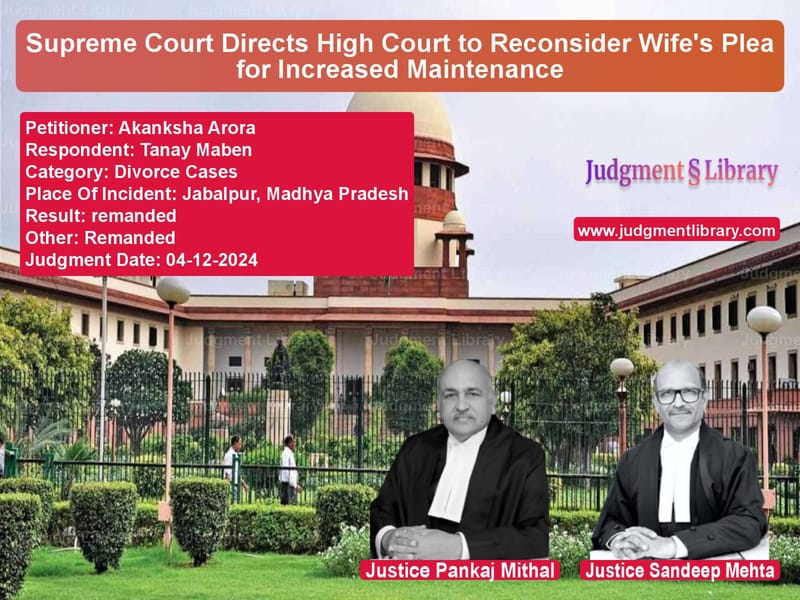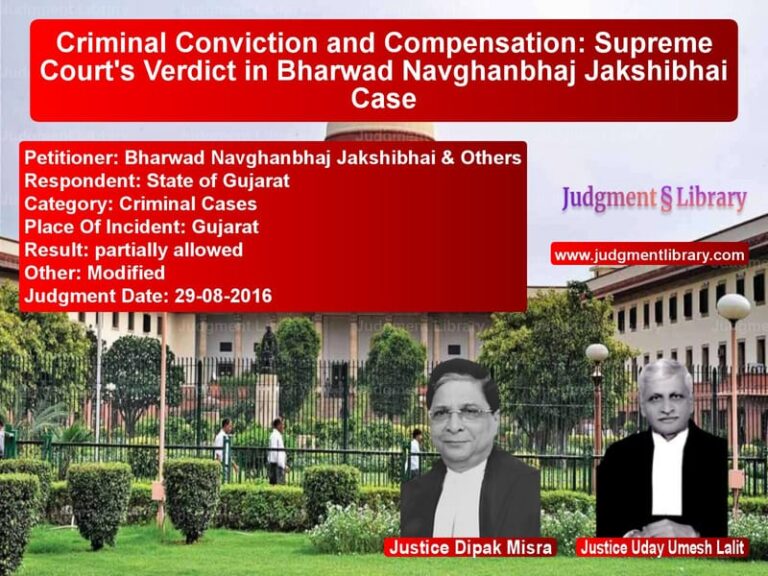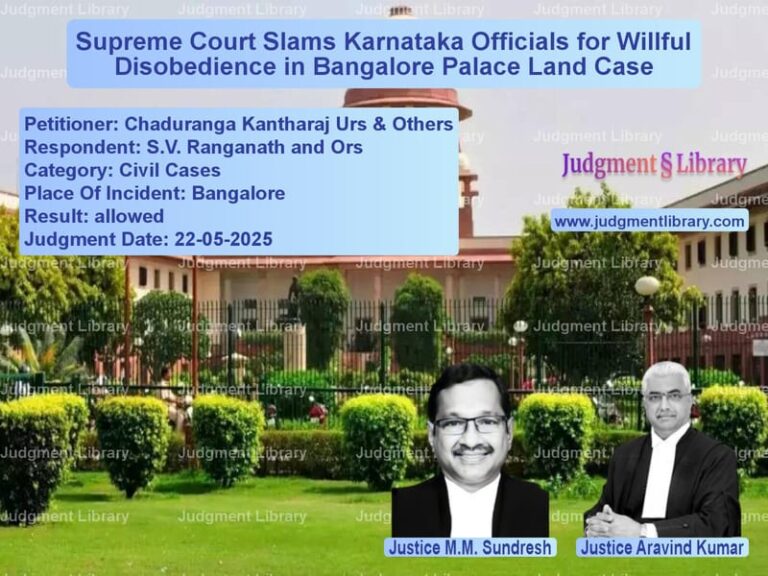Supreme Court Directs High Court to Reconsider Wife’s Plea for Increased Maintenance
The Supreme Court of India recently ruled in the case of Akanksha Arora v. Tanay Maben, where it overturned a High Court decision that dismissed the appellant-wife’s plea for enhanced interim maintenance on technical grounds. The judgment emphasized that procedural technicalities should not stand in the way of substantive justice, particularly in family disputes.
Background of the Case
The dispute arose when the Family Court, in an order dated March 8, 2022, awarded interim maintenance to the appellant-wife under Section 125 of the Code of Criminal Procedure (CrPC). Unhappy with the quantum of maintenance, the appellant approached the High Court of Jabalpur by filing a petition under Section 482 CrPC, seeking an increase in the amount. The High Court dismissed the petition on the ground that the appellant should have sought relief through a revision petition under Section 397 CrPC instead.
Key Legal Issues
- Whether the High Court was correct in dismissing the petition based on procedural technicality.
- Whether the High Court should have exercised its inherent powers to convert the Section 482 petition into a revision petition under Section 397 CrPC.
- The impact of procedural barriers on access to justice in maintenance-related disputes.
Arguments by the Appellant
The appellant’s counsel presented the following arguments:
- The High Court should have focused on the substantive justice rather than technicalities, as the issue at hand involved financial support for a dependent spouse.
- Courts have previously recognized that the nomenclature of a petition should not determine the outcome of a case.
- The High Court had the discretion to treat the Section 482 petition as a revision petition and proceed accordingly.
- By dismissing the petition outright, the High Court compelled the appellant to approach the Supreme Court, leading to unnecessary litigation.
Arguments by the Respondent
The respondent did not appear before the Supreme Court to contest the appeal. However, the State’s counsel supported the High Court’s decision, contending that the correct procedural route should be followed in judicial matters. The arguments included:
- Section 397 CrPC provides a specific remedy for challenging maintenance orders, and the appellant should have used this provision.
- Allowing petitions under Section 482 CrPC in such cases would undermine the framework of criminal procedure.
- The High Court was justified in dismissing the petition to maintain procedural discipline in the legal system.
Supreme Court’s Observations
The Supreme Court took a broader view of the matter, holding that:
- Technicalities should not hinder justice, especially in cases involving maintenance for dependent spouses.
- The High Court should have converted the petition under Section 482 CrPC into a revision petition under Section 397 CrPC instead of dismissing it outright.
- There is ample precedent where courts have held that procedural formalities should not override the fundamental right to seek justice.
In its ruling, the Supreme Court cited earlier decisions:
“The nomenclature of a petition is immaterial. The High Court can always convert a petition under Section 482 CrPC to a revision under Section 397 CrPC and vice versa.”
The Court also referred to Prabhu Chawla v. State of Rajasthan, where it held that:
“Nothing in CrPC, not even Section 397, can affect the inherent powers of the court under Section 482 CrPC.”
Final Judgment
The Supreme Court allowed the appeal and set aside the High Court’s order dated September 21, 2023. The matter was remanded to the High Court with instructions to treat the Section 482 CrPC petition as a revision petition under Section 397 CrPC and decide it on merits after affording an opportunity of hearing to both parties.
The Court also expressed concern over unnecessary litigation, stating:
“The approach of the High Court in dismissing the petition on hyper-technical grounds has unnecessarily compelled the appellant to approach this Court.”
Implications of the Judgment
The ruling reinforces the principle that procedural barriers should not prevent access to justice. It sets an important precedent in the following ways:
- Courts must prioritize substantive justice over technicalities, particularly in family disputes.
- High Courts should use their discretion to convert petitions instead of dismissing them outright.
- The judgment ensures that maintenance-seeking spouses are not unduly burdened by procedural complexities.
Conclusion
This case highlights the Supreme Court’s commitment to ensuring justice is not denied due to procedural formalities. By allowing the appellant’s plea and directing the High Court to reconsider the matter on merits, the judgment upholds the fundamental rights of maintenance seekers. It serves as a crucial precedent for future cases where procedural technicalities might otherwise obstruct justice.
Petitioner Name: Akanksha Arora.Respondent Name: Tanay Maben.Judgment By: Justice Pankaj Mithal, Justice Sandeep Mehta.Place Of Incident: Jabalpur, Madhya Pradesh.Judgment Date: 04-12-2024.
Don’t miss out on the full details! Download the complete judgment in PDF format below and gain valuable insights instantly!
Download Judgment: akanksha-arora-vs-tanay-maben-supreme-court-of-india-judgment-dated-04-12-2024.pdf
Directly Download Judgment: Directly download this Judgment
See all petitions in Alimony and Maintenance
See all petitions in Divorce by Desertion
See all petitions in Judgment by Pankaj Mithal
See all petitions in Judgment by Sandeep Mehta
See all petitions in Remanded
See all petitions in Remanded
See all petitions in supreme court of India judgments December 2024
See all petitions in 2024 judgments
See all posts in Divorce Cases Category
See all allowed petitions in Divorce Cases Category
See all Dismissed petitions in Divorce Cases Category
See all partially allowed petitions in Divorce Cases Category







